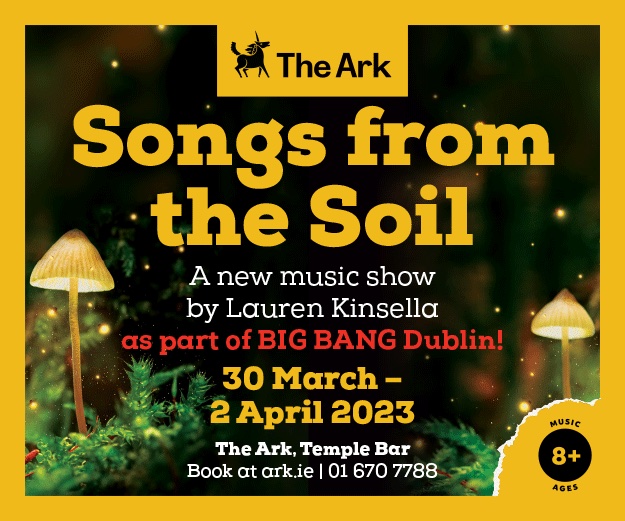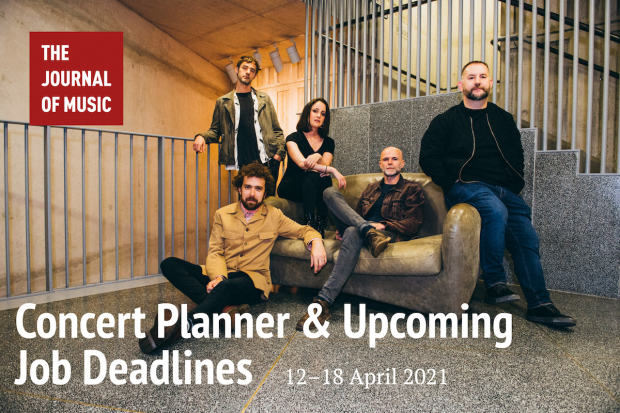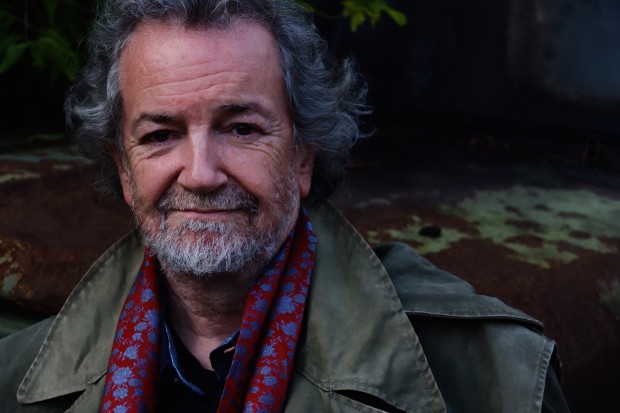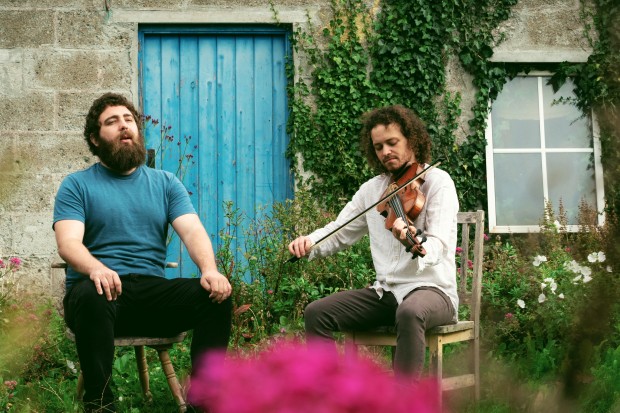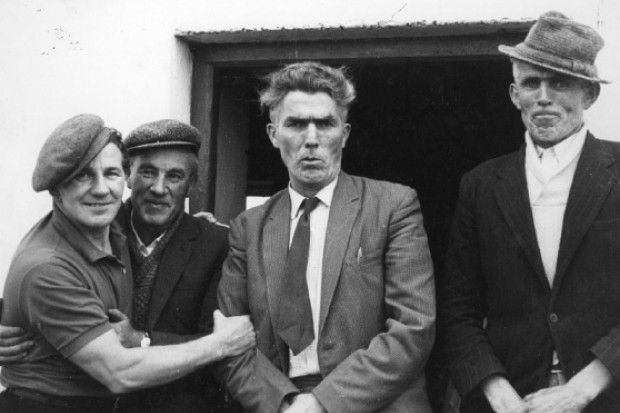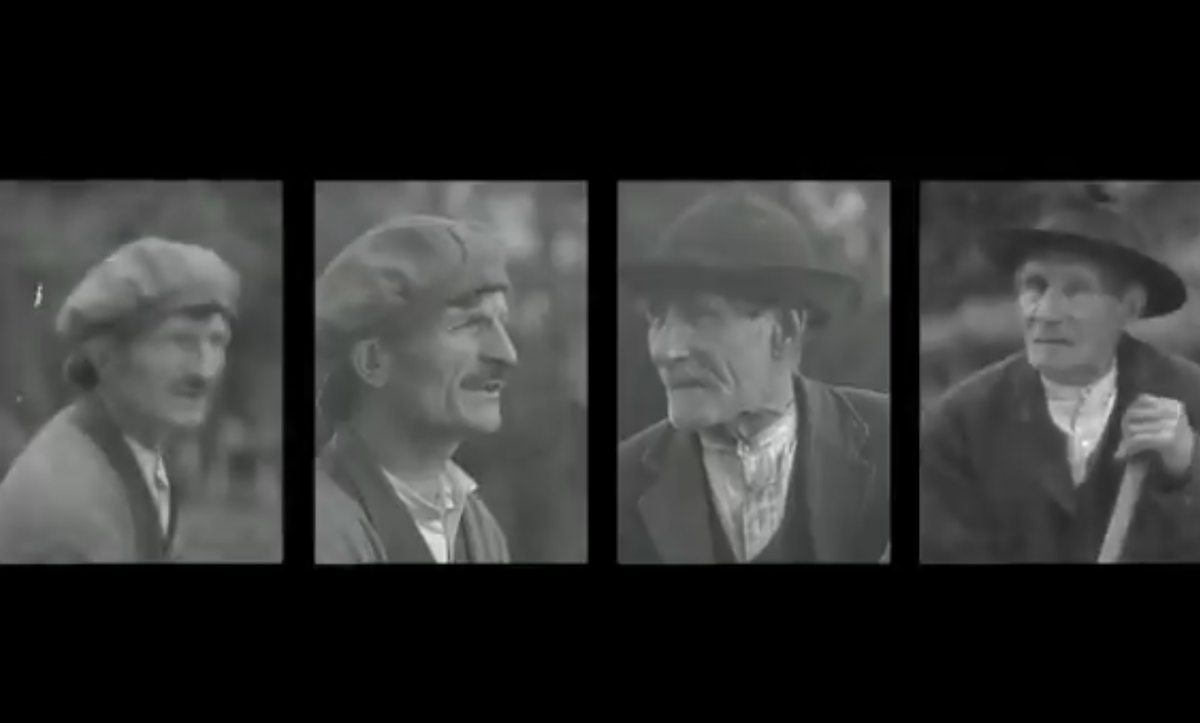
A still from ‘A Weldon Kane Report – Joe Heaney Was a Time Traveller’.
Is Music Timeless?
Joe Heaney Was a Time Traveller opens loud, promising us in slick title cards that ‘no one knew the truth’ about a secret society of time-travelling traditional Irish musicians, ‘UNTIL NOW’. The video, the pseudonymous Weldon D. Kane’s contribution to MusicTown 2021 (18 April), comprises archival footage from the early twentieth century, often lightly manipulated: for instance, four dancers before an audience at a crossroads, in which we are actually seeing three or four superimposed versions of the same film, each displaced by a frame or so, giving an overall effect of heightened, shimmering movement to the dancers.
Accompanying these images are archival music recordings: in this scene it is singer Elizabeth Cronin, but elsewhere there is singer Padraig Ó Tuama, concertina player Elizabeth Crotty, and, of course, the Conamara sean-nós singer Joe Heaney. But the music, too, is manipulated. Cronin’s voice is accompanied by versions of itself put through filters and some ambient electronica. Later, Pádraig O’Keeffe’s fiddle-playing is given almost neat, until a glorious little moment when the man on screen, who until now we have been watching in strange backwards-and-forwards video loops, finally starts playing his horn, and O’Keeffe is joined by a rich synth choir.
These two elements are the sole constituents of this spare film: a handful of sensitively remixed performances by some great traditional musicians, and some wittily cut stock footage of Irish peasants (and donkeys). The connection between these two elements is never more than gestural, and it would be easy to dismiss Joe Heaney Was a Time Traveller as a sentimental set of vignettes about pre-modern rural Ireland. For all its pomp – or, perhaps, comic grandiloquence – the ambitious opening seems not to really go anywhere for the rest of the film.
But my mind kept returning to the incongruity of those science-fiction opening cards, and I think there’s something sharper at play here.
A letter accompanying the video for ‘A Weldon Kane Report – Joe Heaney Is a Time Traveller’.
A man who put in the work
Consider how great art can seem sort of unstuck in time. We say it’s ‘timeless’ or ‘ahead of its time’, that it transcends its social milieu – even while, at the same time, it manifestly originates in a very particular place (for instance, Beethoven wrote for the instruments at his disposal; he didn’t write ‘music in general’). How this sort of transcendence is possible is a question to which philosophers do not yet have an answer, and there is always a temptation, in face of this sort of stubborn incomprehensibility, to explain away the mystery: to bring timeless musicians down to earth, remind each other of their feet of clay. Joe Heaney was not anything mysterious, not a time traveller or a ‘genius’: he was just a man who put in the work.
The danger with this temptation, though, is that it can give us an excuse to avert our eyes from that which is, in its truculent mysteriousness, too difficult to face head on. This aversion of our gaze is present not just in academic polemics about whether there is such a thing as genius at all (is it not suspicious how disproportionately it is conferred on already privileged demographic groups?), but in the way all of us belittle great music by, for instance, using it as background music while driving to work, instead of attending carefully to it.
Not that there’s anything wrong with not always looking directly at the sun. But it is important to balance out this drive to belittle; to periodically remind ourselves of just how absurd it is that there have been so many musicians – and musicians so close to home – who have given us timeless music.
Is ‘time travel’ not rather hyperbolic imagery to employ just in order to remind us that Joe Heaney could really sing? Quite the contrary: time travel is impossible, but at least we know what it would look like to do it. Joe Heaney is impossible too, but here, we don’t even know why. It is the service of reminding us of this, I suggest, that Joe Heaney Was a Time Traveller is rendering us.
Published on 5 May 2021
James Camien McGuiggan studied music in Maynooth University and has a PhD in the philosophy of art from the University of Southampton. He is currently an independent scholar.











